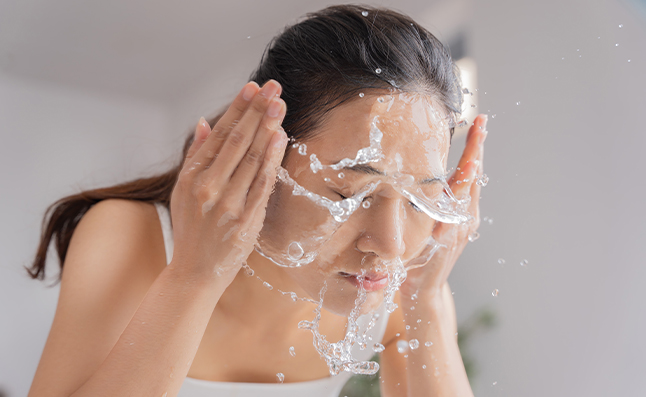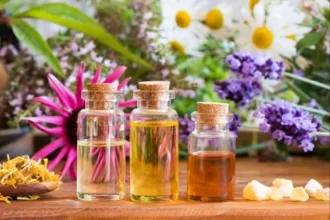In the quest for radiant and healthy skin, many are turning to Ayurvedic skincare, an age-old practice rooted in holistic well-being. If you’re new to Ayurveda and wondering how to embark on an Ayurvedic skincare journey, you’ve come to the right place. This comprehensive guide will walk you through the fundamentals of Ayurvedic skincare, helping you establish a personalized routine that nurtures your skin’s natural beauty.
What is Ayurvedic Skincare?
Ayurvedic skincare is a holistic approach to skin health that finds its roots in Ayurveda, an ancient Indian system of medicine. Unlike conventional skincare, which often focuses solely on surface beauty, Ayurvedic skincare takes a more profound approach, aiming to harmonize the mind, body, and spirit to achieve healthy and radiant skin.
The Holistic Approach
At its core, Ayurvedic skincare believes that the state of your skin reflects the balance within you. It acknowledges that inner well-being is intertwined with external appearance. In this holistic approach, skincare isn’t just about cosmetics; it’s a reflection of overall health.
Understanding Doshas
One of the fundamental principles of Ayurvedic skincare is the dosha system. Ayurveda identifies three primary doshas: Vata, Pitta, and Kapha, each associated with specific elements and qualities. Identifying your dominant dosha is pivotal for tailoring your skincare regimen to meet your unique needs.
1. Vata Dosha
Characteristics: Dry and delicate skin
Needs: Hydration, nourishment, and protection from harsh environmental elements
2. Pitta Dosha
Characteristics: Sensitive and prone to inflammation
Needs: Cooling and soothing ingredients to reduce irritation and redness
3. Kapha Dosha
Characteristics: Oily and prone to congestion
Needs: Cleansing, detoxification, and balancing of oil production
Tailored Skincare
Ayurvedic skincare isn’t one-size-fits-all. It involves using natural and herbal products specifically chosen to align with your dosha. These products include cleansers, toners, moisturizers, and specialized treatments. By selecting products that match your dosha, you can restore balance to your skin.
The Role of Diet
Ayurvedic skincare doesn’t stop at topical treatments. It extends to mindful eating. This practice recognizes that what you consume profoundly influences your skin’s health. Consuming foods that suit your dosha can be a powerful way to support your skin from the inside out.
Ayurvedic skincare offers a comprehensive and personalized approach to achieving healthy and radiant skin. By considering the interconnectedness of the mind, body, and spirit, it seeks to balance and beautify your skin naturally. Through an understanding of your dosha and the use of suitable products and dietary choices, Ayurvedic skincare paves the way to skin that reflects your inner harmony.
1. Ayurveda: Ancient Wisdom for Modern Skin
In the quest for timeless beauty and skin that radiates health, many are turning to the age-old wisdom of Ayurveda. Ayurveda, which translates to “knowledge of life” in Sanskrit, is an ancient Indian system of medicine that has, for centuries, offered holistic solutions for overall well-being, including skincare. This holistic approach to skincare embraces the idea that true beauty stems from inner balance and harmony.
The Essence of Ayurveda
Ayurveda’s core principle is simple yet profound: the mind, body, and spirit are interconnected, and their harmony is vital for good health and beautiful skin. Unlike modern skincare, which often fixates on superficial concerns, Ayurvedic skincare digs deep into the root causes of skin issues.
The Dosha System
Central to Ayurvedic skincare is the dosha system, a framework that categorizes individuals into three primary doshas: Vata, Pitta, and Kapha. Each dosha is associated with specific elements and qualities, and understanding your dominant dosha is key to tailoring your skincare regimen effectively.
1. Vata Dosha
Characteristics: Vata skin tends to be dry, thin, and delicate.
Needs: To combat dryness and maintain moisture, Vata skin benefits from nourishing oils and gentle exfoliation.
2. Pitta Dosha
Characteristics: Pitta skin is typically sensitive, prone to redness, and can be acne-prone.
Needs: Cooling, calming ingredients like aloe vera and chamomile can help soothe and balance Pitta’s skin.
3. Kapha Dosha
Characteristics: Kapha skin is often oily, thick, and prone to congestion.
Needs: Cleansing and detoxifying ingredients such as clay masks and citrus-based products can help manage excess oil.
Customized Skincare
Ayurvedic skincare is inherently personalized. It encourages the use of natural and herbal products carefully selected to align with your dosha. These may include cleansers, toners, moisturizers, and specialized treatments. By choosing products that resonate with your dosha, you can restore balance to your skin.
The Role of Nutrition
Ayurvedic skincare goes beyond creams and serums; it extends to the plate. This ancient wisdom emphasizes mindful eating, acknowledging that your diet significantly impacts your skin. Consuming foods that align with your dosha can nurture your skin from within.
Ayurvedic skincare offers a time-tested and holistic approach to achieving and maintaining beautiful skin. By recognizing the intricate connection between the mind, body, and spirit, Ayurveda empowers individuals to achieve a radiant complexion naturally. Through an understanding of one’s dosha and the use of suitable products and dietary choices, Ayurvedic skincare provides a path to skin that reflects inner harmony and vitality.
2. Ayurvedic Skincare: A Holistic Approach
Ayurvedic skincare integrates the principles of Ayurveda into your daily beauty regimen. It acknowledges that your skin is a reflection of your internal health and seeks to address imbalances from within, resulting in vibrant, glowing skin.
Discover Your Dosha
Central to Ayurvedic skincare is the concept of doshas, or your unique mind-body constitution. Understanding your dosha is crucial in tailoring your skincare routine to your individual needs.
The Three Doshas
Vata: Associated with air and ether elements, Vata skin tends to be dry, delicate, and prone to fine lines.
Pitta: Aligned with fire and water elements, Pitta skin is sensitive, prone to inflammation, and may tend to redness.
Kapha: Rooted in earth and water elements, Kapha skin is often oily, prone to congestion, and may develop large pores.
Identifying Your Dosha
To determine your dosha, consider taking a dosha quiz or consulting with an Ayurvedic practitioner. Once you know your dosha, you can customize your skincare routine accordingly.
3. Ayurvedic Skincare Essentials
Now that you have a basic understanding of Ayurveda and your dosha, let’s explore the core elements of an Ayurvedic skincare routine.
Cleansing: The Foundation of Ayurvedic Skincare
Proper cleansing is essential in Ayurvedic skincare. Use a gentle, natural cleanser that suits your dosha to remove impurities without stripping your skin of its natural oils.
Toning: Balancing Your Skin
Toning helps restore your skin’s pH balance. Opt for toners infused with botanical extracts like rosewater or aloe vera to soothe and rejuvenate your skin.
Moisturizing: Nourishing Your Skin
Select a moisturizer that aligns with your dosha. Vata skin benefits from rich, hydrating creams, while Pitta skin thrives on lightweight, cooling lotions. Kapha skin benefits from oil-free, non-comedogenic products.
Protecting: Shielding from Environmental Stress
Ayurvedic skincare includes protection from the elements. Use a natural sunscreen with SPF to guard your skin from harmful UV rays.
Specialized Treatments: Targeting Skin Concerns
For specific skin concerns like acne or ageing, Ayurveda offers a range of herbal remedies and treatments. Consult an Ayurvedic practitioner for personalized advice.
4. Ayurvedic Skincare Tips
Ayurvedic skincare offers a holistic approach to maintaining healthy and radiant skin. Rooted in ancient wisdom, these tips encompass not only external skincare practices but also internal well-being for a truly balanced complexion.
1. Know Your Dosha
Understanding your dosha (Vata, Pitta, or Kapha) is fundamental. It guides your skincare routine and product choices, ensuring they align with your unique constitution.
Vata: Prioritize hydration and gentle nourishment.
Pitta: Focus on cooling and calming ingredients.
Kapha: Emphasize cleansing and oil regulation.
2. Use Natural Ingredients
Opt for natural and herbal products that are tailored to your dosha. Look for ingredients like aloe vera, turmeric, neem, and rose for a gentle and effective skincare regimen.
3. Mindful Cleansing
Cleanse your face twice a day, morning and night. Use a cleanser that suits your dosha to remove impurities without overstripping natural oils.
4. Exfoliate Gently
Exfoliation is crucial for removing dead skin cells. For Vata and Pitta skin, choose mild exfoliants like oatmeal or almond meal. Kapha skin benefits from slightly more vigorous exfoliation with ingredients like clay.
5. Hydrate Adequately
Keeping your skin hydrated is essential for all doshas. Use a moisturizer that matches your skin type, whether it’s a lightweight lotion or a richer cream.
6. Soothing Masks
Consider using Ayurvedic face masks once a week. For Vata, opt for hydrating masks with honey and milk. Pitta skin benefits from cooling masks with cucumber or aloe vera. Kapha skin responds well to clay masks for deep cleansing.
7. Balanced Diet
Eat foods that align with your dosha to nourish your skin from the inside out. For instance, Vata types may focus on warming, grounding foods, while Pitta types can benefit from cooling, soothing options.
8. Stay Hydrated
Drink plenty of water throughout the day to keep your skin hydrated and support detoxification.
9. Stress Management
Ayurvedic skincare emphasizes mental well-being. Practice stress reduction techniques like yoga and meditation to keep your mind and skin calm.
10. Adequate Sleep
Ensure you get enough restorative sleep, as it’s crucial for skin repair and rejuvenation.
11. Protect from the Sun
Shield your skin from harsh sun exposure using natural sunscreens or protective clothing.
12. Regular Detoxification
Consider periodic detoxification practices, like Ayurvedic oil massage (Abhyanga), to remove toxins and promote skin health.
13. Stay Active
Engage in regular physical activity to improve circulation and overall well-being.
14. Consult an Ayurvedic Practitioner
For personalized skincare guidance, consult an Ayurvedic practitioner who can provide tailored recommendations based on your dosha and unique needs.
15. Patience and Consistency
Ayurvedic skincare is a journey, not a quick fix. Be patient and consistent with your routine, and you’ll gradually notice the benefits of balanced, radiant skin.
Incorporating these Ayurvedic skincare tips into your daily life can lead to not only beautiful but also healthy skin that reflects your inner well-being.
5. Stress Management: The Mind-Skin Connection
In the fast-paced world we live in, stress has become an inevitable part of life. However, what many may not realize is that stress doesn’t just affect your mental state; it also takes a toll on your skin. Understanding the intricate relationship between stress and skin is crucial for managing both your well-being and your complexion.
The Stress-Skin Connection
1. The Hormone Havoc: When you’re stressed, your body releases cortisol, often referred to as the “stress hormone.” Elevated cortisol levels can trigger increased oil production in your skin, potentially leading to breakouts.
2. Inflammation Intensifies: Stress can exacerbate inflammation throughout your body, including your skin. This can worsen skin conditions like acne, eczema, and psoriasis.
3. Slows Healing: High-stress levels can hinder your skin’s ability to repair itself. This means that wounds may take longer to heal, and you may notice scars more prominently.
4. Dull Complexion: Stress can lead to poor circulation, resulting in a dull, lacklustre complexion. Reduced blood flow means fewer nutrients reaching your skin cells.
5. Accelerated Aging: Chronic stress can speed up the ageing process. Collagen, the protein responsible for maintaining skin’s elasticity, can break down more rapidly under prolonged stress.
Stress Management for Healthy Skin
1. Mindfulness Meditation: Engaging in mindfulness meditation can help reduce stress by focusing your attention on the present moment, allowing your body and mind to relax.
2. Regular Exercise: Physical activity releases endorphins, which are natural stress reducers. Exercise also promotes healthy circulation, nourishing your skin.
3. Adequate Sleep: Prioritize sleep to allow your body to repair and rejuvenate. Lack of sleep can lead to increased stress and exacerbate skin issues.
4. Balanced Diet: Eating a diet rich in antioxidants, vitamins, and minerals can support skin health. Foods like fruits, vegetables, and whole grains provide essential nutrients for your skin.
5. Hydration: Proper hydration is vital for skin health. Water helps flush toxins from your body and keeps your skin cells plump and vibrant.
6. Limit Stimulants: Reduce caffeine and alcohol intake, as these substances can trigger stress and dehydrate your skin.
7. Skincare Routine: Implement a consistent skincare routine with products suitable for your skin type. This can help mitigate the effects of stress on your complexion.
8. Time Management: Organize your day to reduce stressors. Prioritize tasks and set realistic goals to prevent feeling overwhelmed.
9. Seek Support: Don’t hesitate to seek support from friends, family, or a mental health professional. Talking about your stressors can alleviate the emotional burden.
10. Breathing Exercises: Practice deep breathing exercises to calm your nervous system and reduce stress levels.
11. Limit Screen Time: Excessive screen time, especially before bed, can disrupt sleep patterns and contribute to stress. Set boundaries for device use.
12. Disconnect: Take breaks from work and digital devices. Spend time in nature or engage in hobbies that relax and rejuvenate you.
Conclusion-:
The mind-skin connection is undeniable. Stress can manifest in various skin issues, from breakouts to premature ageing. By incorporating stress management techniques into your daily life, you not only improve your mental well-being but also promote healthy, glowing skin. Remember that self-care isn’t just about skincare products; it’s about caring for your mind and body as a whole.















